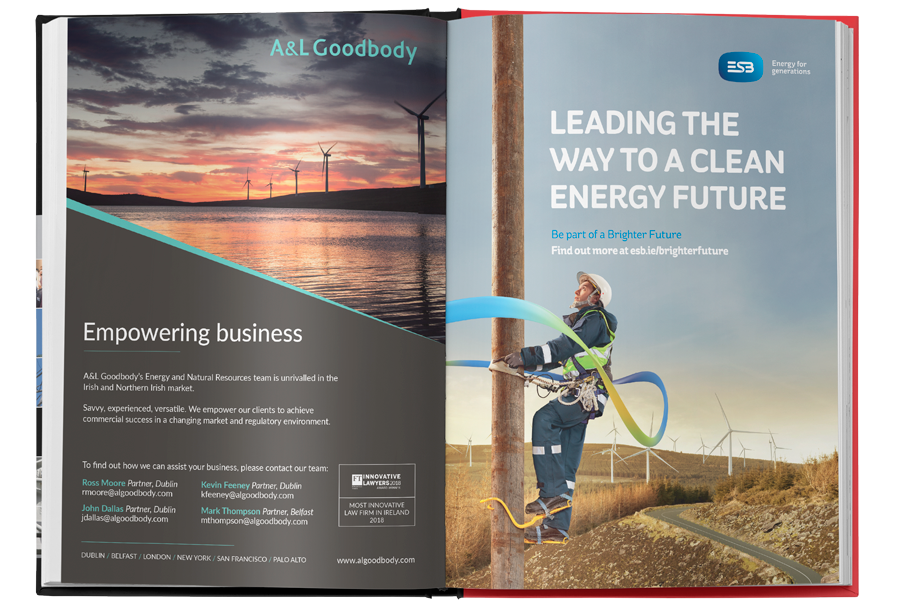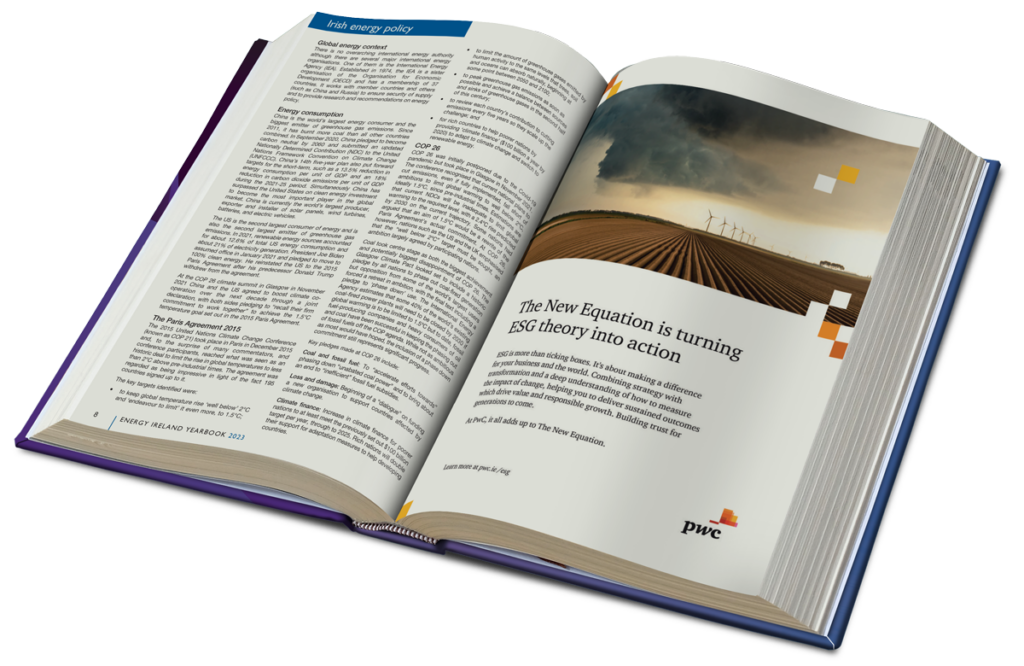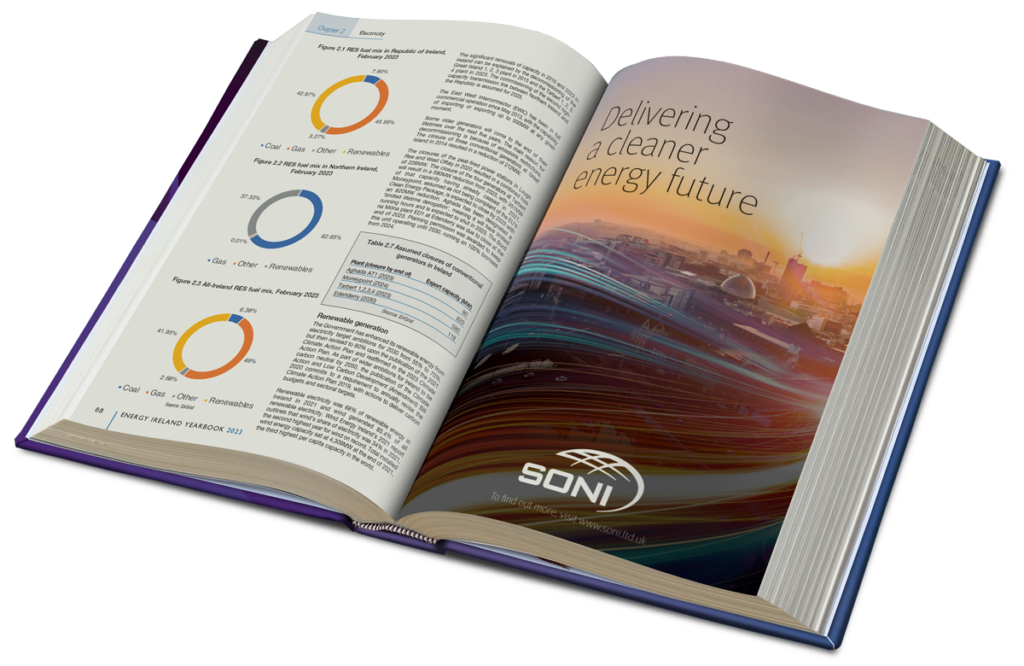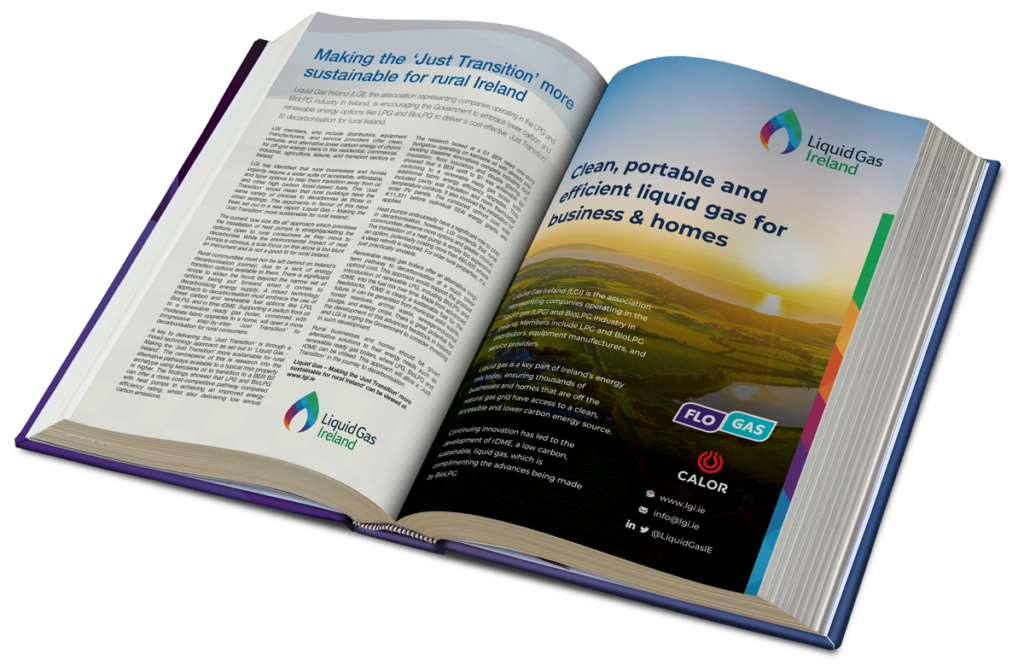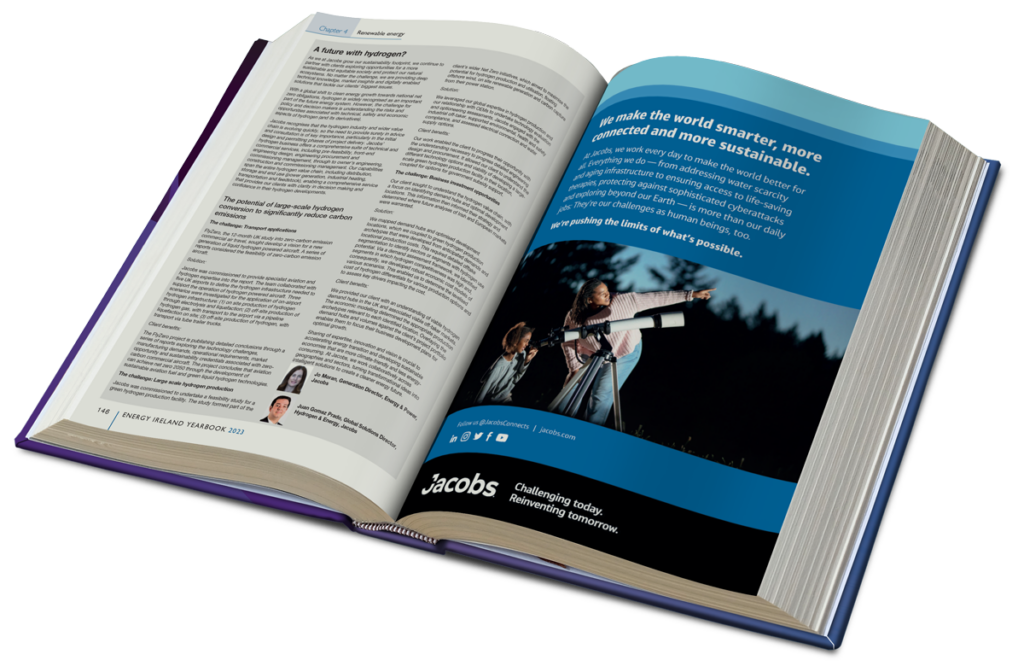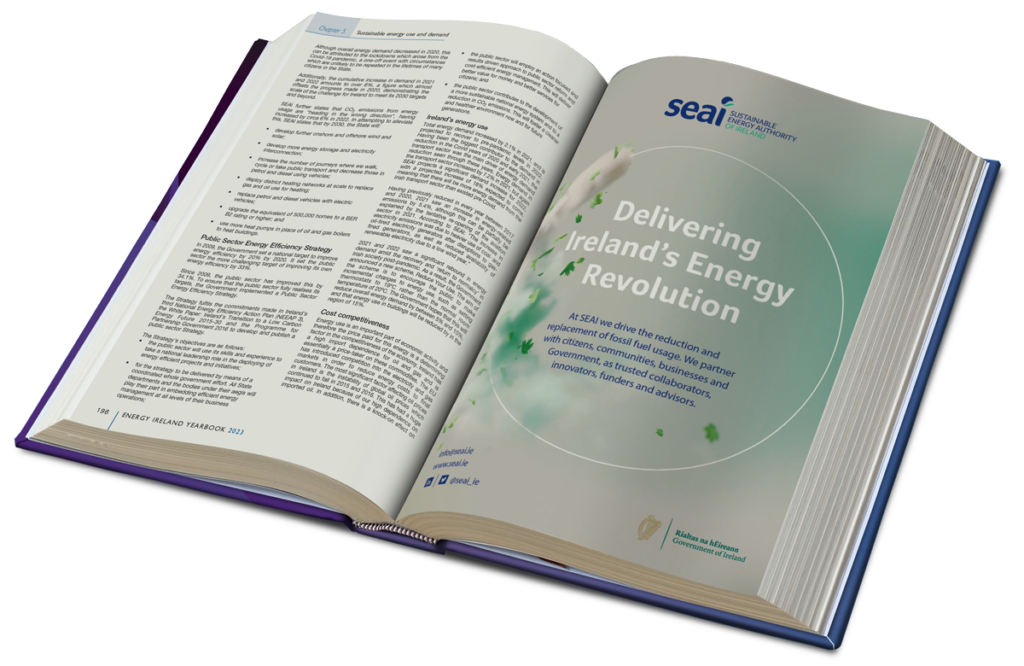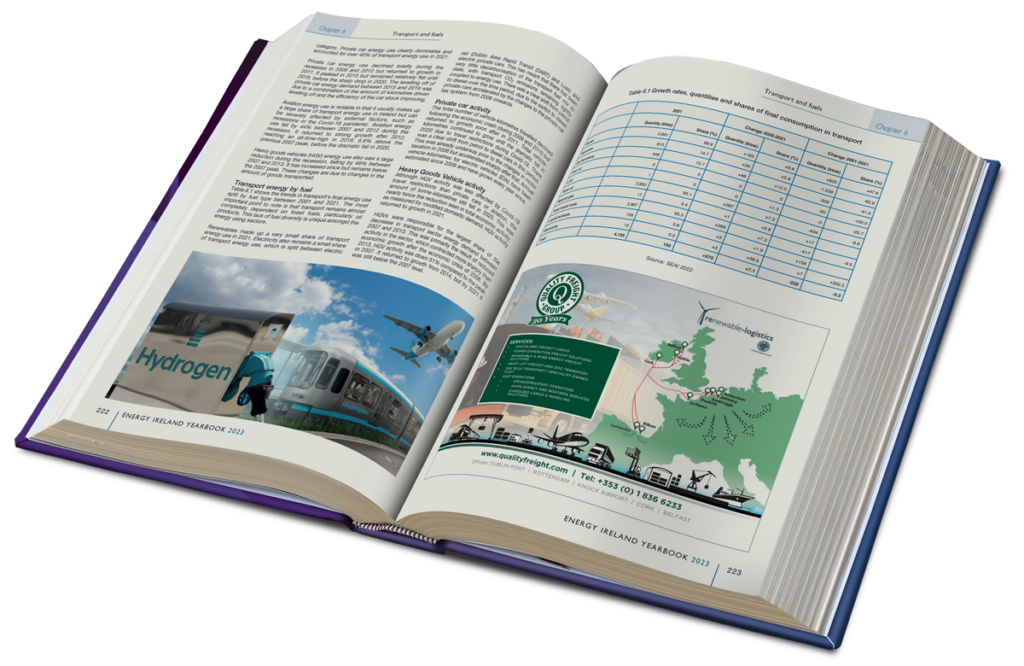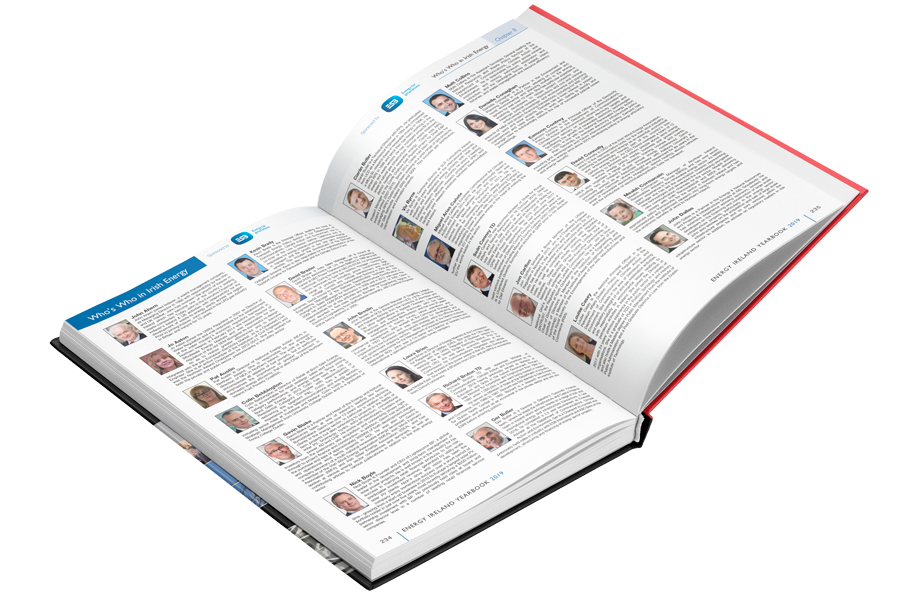Energy Ireland Yearbook 2024
For over 25 years the Energy Ireland Yearbook has been the essential one-stop source for anyone interested or involved in Irish energy. The yearbook is used extensively by policymakers, major energy companies, facilities managers, large energy users and service organisations involved in Ireland’s rapidly developing energy sector. The Yearbook covers all aspects of Irish energy including major policy issues, who the key decision makers are, sub-sectoral analysis and comprehensive directory listings.
Sponsored by
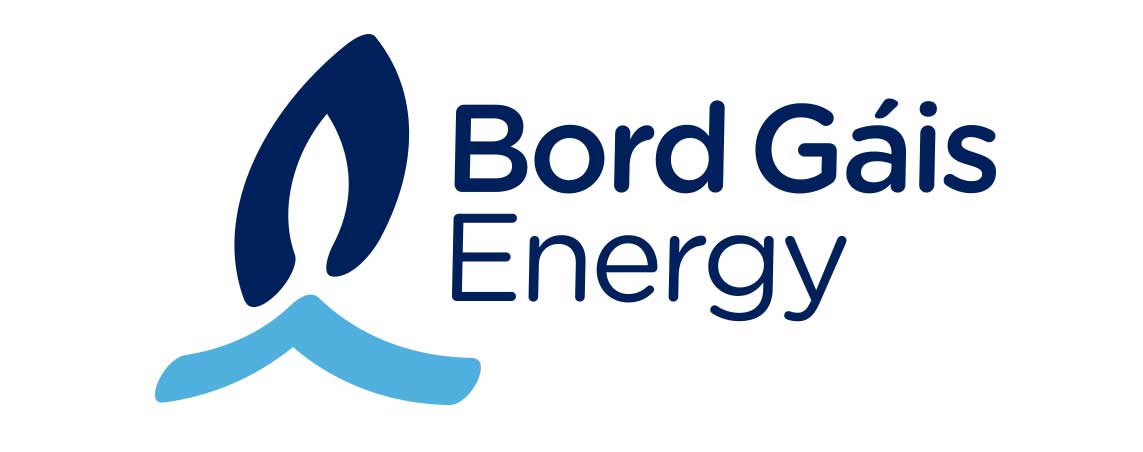
How can the Yearbook benefit your organisation?
The Energy Ireland Yearbook is the only detailed guide that encompasses energy in Ireland, north and south. It will keep you updated and informed of all the latest developments and the key people and organisations working in each sector. It is a useful business development tool.
Unique features of the Yearbook
The Yearbook incorporates a number of unique features:
- 300 pages crammed with useful information;
- expert analysis by guest contributors on key issues in Irish energy;
- listings of all relevant policy-makers and government agencies;
- a detailed guide to each sector, with listings of organisations active in the sector;
- a unique energy Who’s Who giving biographical details of the 200 top ‘movers and shakers’ on the Irish energy scene;
- directory of companies selling products and services into the Irish energy sector;
- useful maps and diagrams of Ireland’s energy infrastructure (power grid, gas pipeline networks).
Detailed contents by chapter
Chapter 2: Electricity
- Global electricity
- Electricity generation
- Demand
- Transmission and distribution
- Retail electricity market
- North/South electricity
- European electricity market reform
- Electricity in Northern Ireland
- Electricity regulation in Ireland
- Electricity organisations and companies
- Electricity licences and authorisations
Chapter 3: Gas in Ireland
- Natural gas: the global context
- Natural gas in Ireland
- Hydrogen development
- Gas usage in transport
- Integrated gas markets
- Natural gas in Northern Ireland
- Natural gas organisations and companies
- Gas licence holders
- Oil and gas exploration bans
- Developments in Irish upstream oil and gas
- Oil and gas in Northern Ireland
- LPG market
- BioLPG
Chapter 4: Renewable energy

- Introduction
- European renewable energy policy
- Renewable and indigenous energy in Ireland
- Energy policy
- Bioenergy development
- Renewable gas
- Wind energy development in Ireland
- Solar energy
- Marine renewables development
- Waste-to-energy technology
- Geothermal energy
- Renewable energy in Northern Ireland
- Renewable heat
- Offshore renewable energy in Northern Ireland
- Renewable and indigenous energy organisations
Chapter 5: Sustainable energy use
- Sustainable energy use: Republic of Ireland
- CHP developers in Ireland
- Energy management for large energy users
- Combined heat and power
- CHP development in Northern Ireland
- Energy Performance of Buildings Directive
- The Sustainable Energy Authority of Ireland (SEAI)
- EU Renovation Wave Strategy
- National Home Retrofit Scheme
- Sustainable energy use: Northern Ireland
- Sustainable energy use in buildings and Residential
- Heat pump systems
- Local energy agencies
Chapter 6: Transport and fuels
- European transport policy
- Irish energy and transport
- Low carbon transport: Reducing emissions
- Downstream petroleum overview
- The Irish oil market
- Petroleum prices
- Petroleum retailing in Ireland
- Fuel companies and retailers
- Renewable energy in transport
- Future fuels: Biofuels
- Alternative fuels: Hydrogen
- Electric vehicles
- Electric vehicles in Ireland
- EV charging infrastructure
- Electric vehicles in Northern Ireland
- Electric vehicles contacts and retailers
Chapter 7: Digital energy
- Digital disruption
- Digital trends: Global
- Digitalisation’s impact on energy
- Transport and energy
- Transport, buildings and industry
- Oil and gas, coal and power
- Electricity systems
- Energy use by ICT
- Cybersecurity
- Digital energy in Europe
- European Technology and Innovation
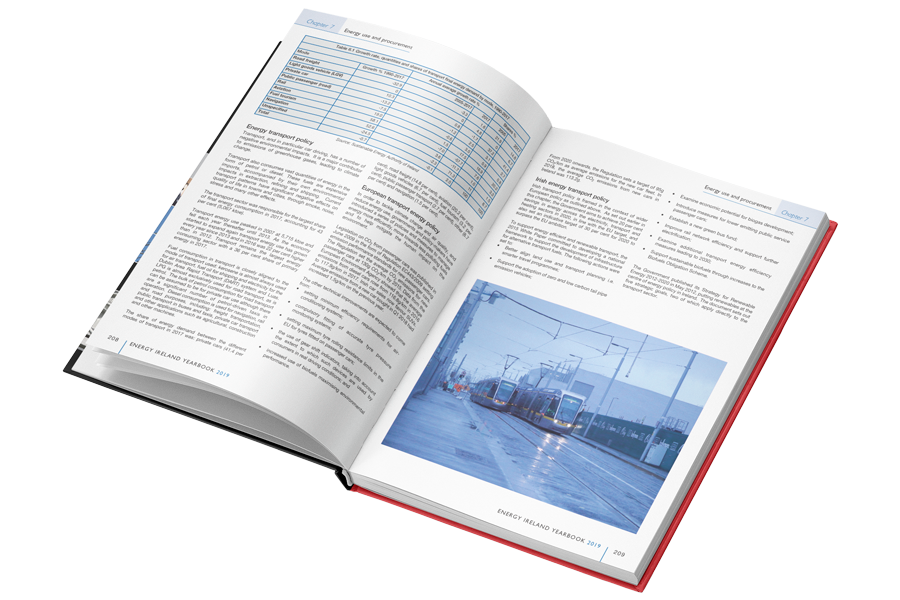
Chapter 9: The Energy Ireland directory
- Representative groups and associations in Irish energy
- Consultants and advisors
- Legal advisors
- Financial and economic consultants
- Technical and engineering consultants
- Renewable energy consultants
- IT consultants and system support companies
- Certification systems
- Equipment and service suppliers
- Power generation and CHP
- Renewable energy technology
- Wind energy
- Bioenergy
- Solar energy
- Monitoring and control systems, instrumentation
- Air conditioning, refrigeration, heating and insulation products
- Mechanical fabrication, pipes, valves and pumps
- Electrical contractors and service providers
- Water treatment and waste management
- Geological/geothermal products and services
- Offshore services
- Marine
- Drilling
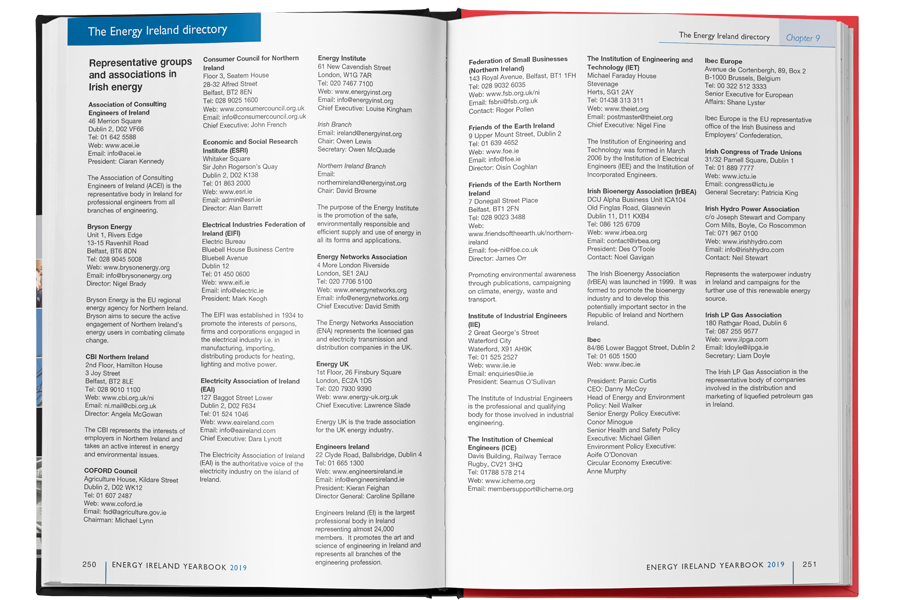
Reference section
- Energy tables and energy approximate equivalents
- Standard conversion factors
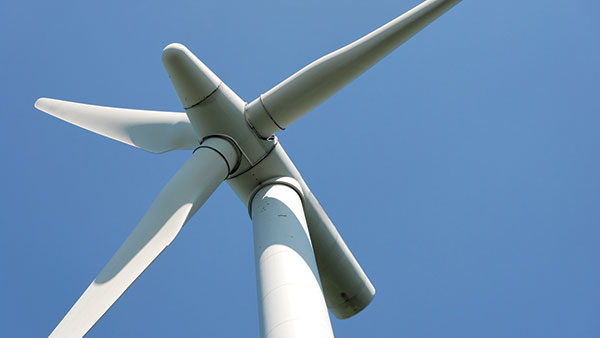
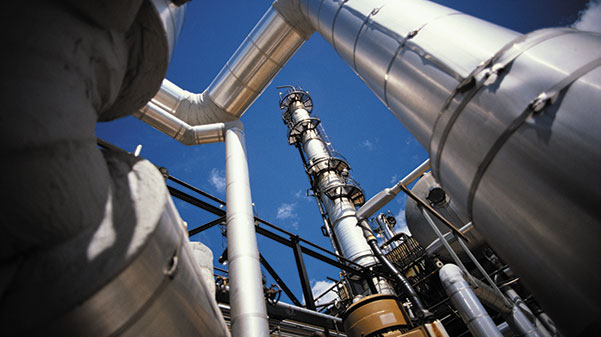

Who is the Energy Ireland Yearbook 2024 for?
The Energy Ireland Yearbook is aimed at both those executives working in the Irish energy sector directly and those serving the sector as consultants, advisors and suppliers.
It is of particular interest to those individuals who need to gain an understanding of the main issues affecting the Irish energy sector and who require contact details for the key players in the sector. It is aimed at people based either north or south in Ireland as well as energy players from outside Ireland who have an interest in Irish energy. The Energy Ireland Yearbook is the essential read for:
- Chief Executives / Managing Directors
- Finance Directors
- Technical / Engineering Managers
- Business Analysts / Planners / Economists
- Heads of Business Development
- Project Developers
- Bankers, Providers of Finance
- Head of Strategy / Corporate Planners
- Legal Advisors
- General Managers, Energy Companies
- Senior Policy Makers / Regulatory Officials
- Large Users of Gas and Electricity
- Facilities Managers
- Engineering Contractors
- Equipment Suppliers
- Engineering and Technical Consultants
In recent years the Yearbook has proved an invaluable tool for energy professionals from beyond Ireland whose role requires them to keep up-to-date with the latest developments and opportunities in the Irish energy sector.
For energy users…
The Energy Ireland Yearbook is read in increasing numbers by those engaged in the practical aspects of energy management for energy-intensive businesses such as dairies, chem/pharm and manufacturing. There is a section specifically dedicated to energy management from an ‘energy-user’ perspective.
To secure your position in the 2025 edition
The Energy Ireland Yearbook is the extensive sourcebook used by top decision makers & senior managers in the Irish energy sector.
For more information on how your organisation can benefit from this all year round presence in the energy publication. Please contact Gail Kinked directly on +353 (0)1 661 3755 or email gail.kinkead@energyireland.ie.
